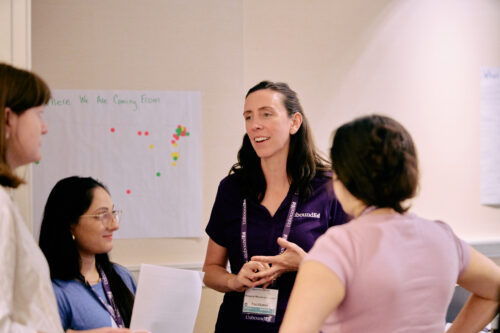About the Pathway
Education leaders are trying to increase student achievement across grades and subjects — all while managing a long list of demands on their time and attention. The Leadership pathway gives leaders the knowledge and skills to confidently support instruction throughout their buildings. Participants learn high-leverage skills for improving instruction, reflect on the mindsets necessary to cultivate student-centered learning environments, and consider the changes required to sustain GLEAM® instruction in their schools and districts.
Give every leader the tools to drive great instruction.
What to Expect
In the Leadership pathway, participants:
- Learn about the math and English Language Arts (ELA) shifts to support improved instructional practices.
- Develop strategies to help teachers address unfinished instruction while maintaining grade-level rigor and engagement.
- Practice observing for and identifying instructional moves that embody grade-level, engaging, affirming, and meaningful — GLEAM — instruction.
- Collaborate with peers to design and plan for system-level changes that support GLEAM instruction.

Who is the Instructional Leadership pathway for?
K-12 district or school leaders, deans and directors of curriculum and instruction, instructional coaches, and academic department heads responsible for instructional leadership
What Participants Learn
-
Day 1
- Connect mindsets to student math identities, highlighting educators’ self-perceptions in teaching and leadership.
- Examine the relationship between GLEAM instruction and the math shifts.
- Evaluate and refine their instructional vision for alignment with GLEAM instruction.
-
Day 2
- Develop strategies to address unfinished instruction while maintaining GLEAM instruction.
- Implement support within grade-level units, lessons, and tasks.
- Identify the alignment between the math shifts and GLEAM instructional practices.
-
Day 3
- Examine the ELA shift towards text complexity and develop scaffolds to support students with comprehending grade-level text.
- Reflect on mindset and practice, discussing how professional learning structures about foundational skills and text complexity can advance GLEAM instruction.
- Identify the alignment between the ELA shifts and GLEAM literacy and foundational skills instruction.
-
Day 4
- Analyze how individuals existing experiences shapes mindsets and beliefs about students’ reading abilities.
- Examine the ELA shift towards building knowledge through content-rich nonfiction and evaluate the power of text sets.
- Develop strategies to implement GLEAM instruction in their local context coherently.
- Use the elements of GLEAM instruction to support teachers through targeted observation, feedback, and coaching.
The facilitators were-well prepared and pushed us as a group to dig deeper with our responses and questions. I felt comfortable taking risks with my responses because of the safe space.
Register for Standards Institute
Standards Institute Pathways


Explore the Pathways
Whether you’re a teacher, coach, principal, or district leader, there is a Standards Insitute pathway that fits your needs.
Learn More